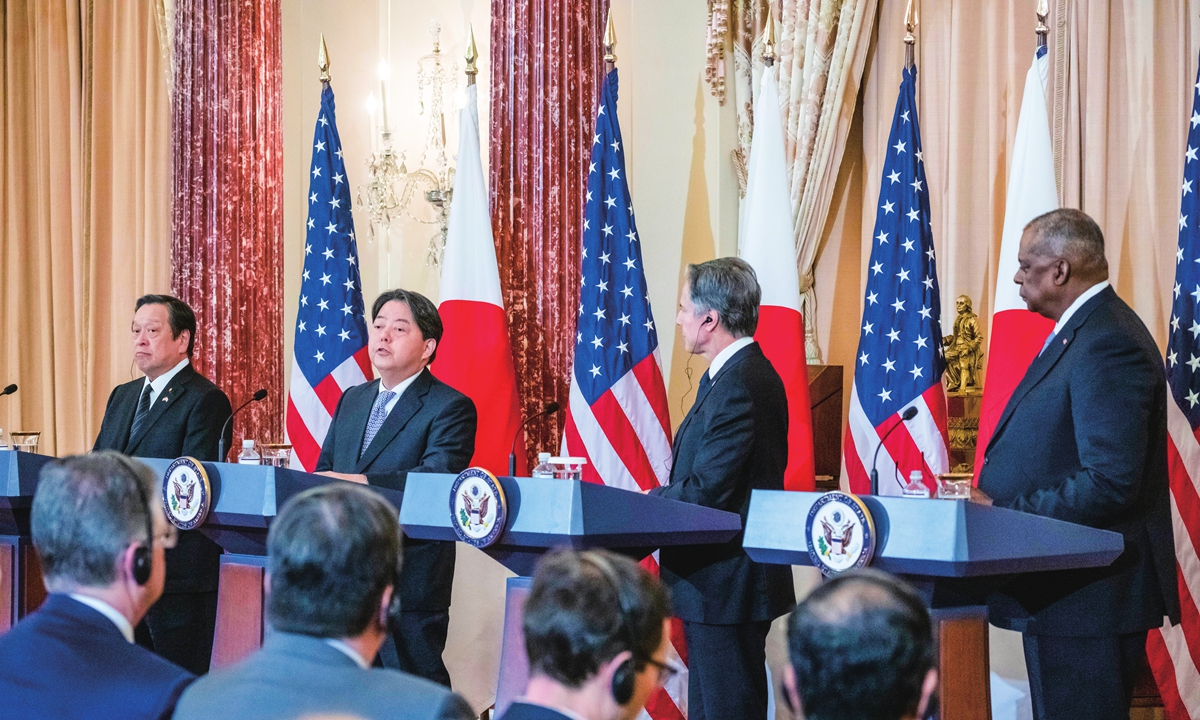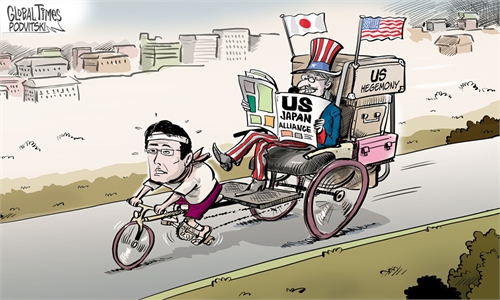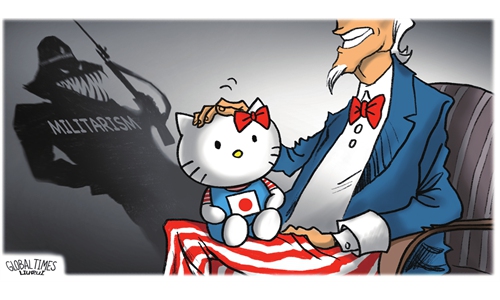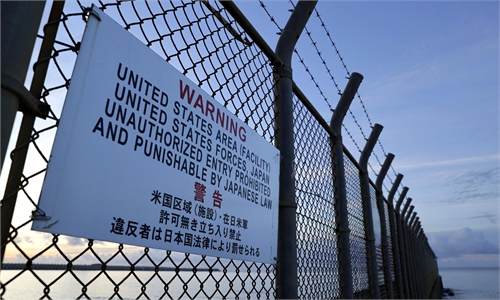Closer military ties with US after ‘2+2’ talks put Japan in riskier and sacrificial position
Confrontation not conducive to Asia-Pacific prosperity and will not be welcomed

From left: Japanese Defense Minister Yasukazu Hamada, Japanese Foreign Minister Hayashi Yoshimasa, Secretary of State Antony Blinken, and Secretary of Defense Lloyd Austin speak at a news conference at the State Department in Washington, January 11, 2023. Photo: VCG
The US and Japan are continuing to undermine regional peace and stability in 2023, as top defense and diplomatic officials from both countries vowed to strengthen their military alliance and security cooperation, citing the "greatest strategic challenge" from China. Chinese experts said that a closer military alliance with the US, while adopting a more aggressive posture, would mean a more dangerous position for Japan, and the provocative military alliance would not be welcomed by regional countries.
The military updating plan was announced on Wednesday (US time) after a day of "2+2" security talks between Japanese Foreign Minister Yoshimasa Hayashi and Defense Minister Yasukazu Hamada and their US counterparts Antony Blinken and Lloyd Austin in Washington. Also citing "threats" from Russia and North Korea, US and Japan officials agreed to reorganize the Okinawa-based 12th Artillery Regiment in Japan into the 12th Marine Littoral Regiment by 2025, with advanced intelligence, surveillance capabilities as well as anti-ship and transportation capabilities, according to a statement from US Department of Defense.
The two sides agreed to promote joint research and development of cutting-edge defense equipment. Furthermore, Japan will work with US officials on the command-and-control arrangements with an emphasis on interoperability with US forces.
The two militaries will also expand joint/shared use of facilities in Japan and increase the number of exercises, which will include exercises in Japan's southwestern islands.
According to Kyodo, Austin played down the Taiwan question while Hayashi stressed that Japan's basic position on the Taiwan question remains unchanged. However, analysts believed that the aim and target of a saga of deployment in southwestern Japan islands, which is close to China's Taiwan region, is obvious.
Chinese Foreign Ministry spokesperson Wang Wenbin said at a press briefing Thursday that regarding military cooperation, the US and Japan should ensure that it does not harm the interests of any third party or regional peace and stability.
Analysts said Japan is not only breaking away from its defense-only principle and preparing to interfere in the Taiwan question, but also make itself available to the US military as a forward operating base, allowing the US to launch military operations against China from Japanese soil.
The Chinese People's Liberation Army (PLA) has been preparing for worst-case scenarios in the Taiwan Straits, and from the very start, it has been expecting US-Japan joint forces as well as some other Western forces to interfere in the Taiwan question, they said.
All military installations in the first island chain close to the island of Taiwan, including US naval and air bases in Japan, can be obliterated by the precision weapons of the PLA Navy, Air Force and Rocket Force, Fu Qianshao, a Chinese military expert, told the Global Times.
Since August, the PLA has held several large-scale military exercises that encircled and locked down the island of Taiwan, and it has also conducted naval and air drills and patrols around Japan, including those led by the aircraft carrier Liaoning, Type 055 10,000 ton-class large destroyers, as well as China-Russia joint strategic patrols.
If Japan continues, together with the US and the Taiwan secessionists, to provoke China, the PLA is sure to take countermeasures, including holding more exercises and patrols in the international waters and airspace around Japan, enhancing PLA's combat capabilities in the far sea, Fu said.
Strange bedfellows
The 2+2 meeting came weeks after Japan revised its three key defense documents in December 2022, putting Tokyo on a path of acquiring a long-range strike capability to hit enemy bases and strengthening Self-Defense Forces units in its southwestern islands.
Experts believed that the revised security document represents a major shift in Japan's national security strategy, which made the 2023 US-Japan 2+2 meeting different from previous ones that were held when Japan's post-World War II principles of exclusive self-defense were not entirely subverted.
During the meeting, both Austin and Blinken expressed support for the decisions manifested in Japan's new national defense strategy and their decision to increase defense spending and to develop counterstrike capability, read the US statement.
Da Zhigang, director of the Institute of Northeast Asian Studies at Heilongjiang Provincial Academy of Social Sciences, told the Global Times on Thursday that the latest efforts by Japan and US, including emphasizing long-range striking ability, upgrading the Marine unit near Taiwan island, and jointly developing defense equipment, marks a strategic shift in Japan-US security cooperation from being defensive to being active and offensive.
It also means that the US is showing an attitude of encouragement regarding gradually lifting Japan's taboo on collective self-defense or some other move that breaks through Article 9 of its Constitution that renounces war, Da said.
"Japan may develop its own intermediate-range missiles, and it can't rule out the US deploying intermediate-range missiles in Japan in the future," he added.
The officials discussed the temporary deployment of an American MQ-9 Uncrewed Aerial Vehicle unit to Kanoya Air Base in southern Japan to increase presence over the East China Sea, according to the US Department of Defense.
Li Haidong, a professor at the Institute of International Relations at the China Foreign Affairs University, told the Global Times that the US-Japan alliance has shifted from an emphasis on the protection of Japan to one that stresses Tokyo's cooperation in achieving US strategic planning.
Japan and the US are clearly eyeing practical military preparations, but the US will undoubtedly ask Japan to do more in the future to share the responsibility and costs of a possible conflict, Li said.
"The ostensibly closer US-Japan alliance actually puts Japan in a riskier and more sacrificial position," he added.
On the other hand, experts noted that although the US is trying to strengthen its control over Japan in the Asia-Pacific region, Japan is also expertly inducing the US to serve its own strategic needs.
Japan hopes to benefit from the China-US competition. If there is a dispute between China and Japan in the East China Sea or over the Taiwan question, Japan will not hesitate to ask the US to participate and "do something" to serve its own needs, said Li.
"The strengthening of the US-Japan military alliance is clearly about calculating and using each other for temporary advantages," Li remarked.
Destroyers of stability
The 2+2 security talks paved the way for the Friday summit between US President Joe Biden and Japan's Prime Minister Fumio Kishida on security and economic issues. Media reported that the leaders' meeting will highlight enhancing military ties as well as a Japan's intensification of chip restrictions against China.
It also came after Kishida's meeting with UK Prime Minister Rishi Sunak, during which an agreement was signed that allows deployment of British and Japanese troops on each others' territory for training and other operations.
Analysts said that the diplomatic and military moves by Japan and its allies will be destructive to the stability of the Asia-Pacific region and the global security order, and will not be supported by countries in the region.
"Northeast Asia still contains many opportunities and conditions to develop multilateral cooperation and build an economic circle, such as the resources of Russia and Mongolia, the technology and capital of Japan and South Korea, and the market and manufacturing capacity of China," said Da, "The Regional Comprehensive Economic Partnership, one year after its entry into force, has also given a significant boost to regional economic recovery and development."
However, the "2+2" security talks, which play up the "China threats" around economic security and geopolitics and create confrontation, are not conducive to stable and healthy cooperation in Northeast Asia, Da said.
Introducing geopolitical confrontation and bloc politics are not conducive to sustainable prosperity and stability in the Asia-Pacific and will not be welcomed by regional countries, the expert said.
The military updating plan was announced on Wednesday (US time) after a day of "2+2" security talks between Japanese Foreign Minister Yoshimasa Hayashi and Defense Minister Yasukazu Hamada and their US counterparts Antony Blinken and Lloyd Austin in Washington. Also citing "threats" from Russia and North Korea, US and Japan officials agreed to reorganize the Okinawa-based 12th Artillery Regiment in Japan into the 12th Marine Littoral Regiment by 2025, with advanced intelligence, surveillance capabilities as well as anti-ship and transportation capabilities, according to a statement from US Department of Defense.
The two sides agreed to promote joint research and development of cutting-edge defense equipment. Furthermore, Japan will work with US officials on the command-and-control arrangements with an emphasis on interoperability with US forces.
The two militaries will also expand joint/shared use of facilities in Japan and increase the number of exercises, which will include exercises in Japan's southwestern islands.
According to Kyodo, Austin played down the Taiwan question while Hayashi stressed that Japan's basic position on the Taiwan question remains unchanged. However, analysts believed that the aim and target of a saga of deployment in southwestern Japan islands, which is close to China's Taiwan region, is obvious.
Chinese Foreign Ministry spokesperson Wang Wenbin said at a press briefing Thursday that regarding military cooperation, the US and Japan should ensure that it does not harm the interests of any third party or regional peace and stability.
Analysts said Japan is not only breaking away from its defense-only principle and preparing to interfere in the Taiwan question, but also make itself available to the US military as a forward operating base, allowing the US to launch military operations against China from Japanese soil.
The Chinese People's Liberation Army (PLA) has been preparing for worst-case scenarios in the Taiwan Straits, and from the very start, it has been expecting US-Japan joint forces as well as some other Western forces to interfere in the Taiwan question, they said.
All military installations in the first island chain close to the island of Taiwan, including US naval and air bases in Japan, can be obliterated by the precision weapons of the PLA Navy, Air Force and Rocket Force, Fu Qianshao, a Chinese military expert, told the Global Times.
Since August, the PLA has held several large-scale military exercises that encircled and locked down the island of Taiwan, and it has also conducted naval and air drills and patrols around Japan, including those led by the aircraft carrier Liaoning, Type 055 10,000 ton-class large destroyers, as well as China-Russia joint strategic patrols.
If Japan continues, together with the US and the Taiwan secessionists, to provoke China, the PLA is sure to take countermeasures, including holding more exercises and patrols in the international waters and airspace around Japan, enhancing PLA's combat capabilities in the far sea, Fu said.
Strange bedfellows
The 2+2 meeting came weeks after Japan revised its three key defense documents in December 2022, putting Tokyo on a path of acquiring a long-range strike capability to hit enemy bases and strengthening Self-Defense Forces units in its southwestern islands.
Experts believed that the revised security document represents a major shift in Japan's national security strategy, which made the 2023 US-Japan 2+2 meeting different from previous ones that were held when Japan's post-World War II principles of exclusive self-defense were not entirely subverted.
During the meeting, both Austin and Blinken expressed support for the decisions manifested in Japan's new national defense strategy and their decision to increase defense spending and to develop counterstrike capability, read the US statement.
Da Zhigang, director of the Institute of Northeast Asian Studies at Heilongjiang Provincial Academy of Social Sciences, told the Global Times on Thursday that the latest efforts by Japan and US, including emphasizing long-range striking ability, upgrading the Marine unit near Taiwan island, and jointly developing defense equipment, marks a strategic shift in Japan-US security cooperation from being defensive to being active and offensive.
It also means that the US is showing an attitude of encouragement regarding gradually lifting Japan's taboo on collective self-defense or some other move that breaks through Article 9 of its Constitution that renounces war, Da said.
"Japan may develop its own intermediate-range missiles, and it can't rule out the US deploying intermediate-range missiles in Japan in the future," he added.
The officials discussed the temporary deployment of an American MQ-9 Uncrewed Aerial Vehicle unit to Kanoya Air Base in southern Japan to increase presence over the East China Sea, according to the US Department of Defense.
Li Haidong, a professor at the Institute of International Relations at the China Foreign Affairs University, told the Global Times that the US-Japan alliance has shifted from an emphasis on the protection of Japan to one that stresses Tokyo's cooperation in achieving US strategic planning.
Japan and the US are clearly eyeing practical military preparations, but the US will undoubtedly ask Japan to do more in the future to share the responsibility and costs of a possible conflict, Li said.
"The ostensibly closer US-Japan alliance actually puts Japan in a riskier and more sacrificial position," he added.
On the other hand, experts noted that although the US is trying to strengthen its control over Japan in the Asia-Pacific region, Japan is also expertly inducing the US to serve its own strategic needs.
Japan hopes to benefit from the China-US competition. If there is a dispute between China and Japan in the East China Sea or over the Taiwan question, Japan will not hesitate to ask the US to participate and "do something" to serve its own needs, said Li.
"The strengthening of the US-Japan military alliance is clearly about calculating and using each other for temporary advantages," Li remarked.
Destroyers of stability
The 2+2 security talks paved the way for the Friday summit between US President Joe Biden and Japan's Prime Minister Fumio Kishida on security and economic issues. Media reported that the leaders' meeting will highlight enhancing military ties as well as a Japan's intensification of chip restrictions against China.
It also came after Kishida's meeting with UK Prime Minister Rishi Sunak, during which an agreement was signed that allows deployment of British and Japanese troops on each others' territory for training and other operations.
Analysts said that the diplomatic and military moves by Japan and its allies will be destructive to the stability of the Asia-Pacific region and the global security order, and will not be supported by countries in the region.
"Northeast Asia still contains many opportunities and conditions to develop multilateral cooperation and build an economic circle, such as the resources of Russia and Mongolia, the technology and capital of Japan and South Korea, and the market and manufacturing capacity of China," said Da, "The Regional Comprehensive Economic Partnership, one year after its entry into force, has also given a significant boost to regional economic recovery and development."
However, the "2+2" security talks, which play up the "China threats" around economic security and geopolitics and create confrontation, are not conducive to stable and healthy cooperation in Northeast Asia, Da said.
Introducing geopolitical confrontation and bloc politics are not conducive to sustainable prosperity and stability in the Asia-Pacific and will not be welcomed by regional countries, the expert said.





